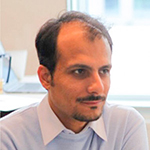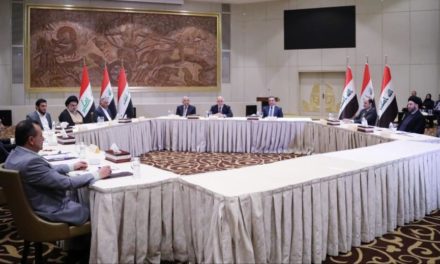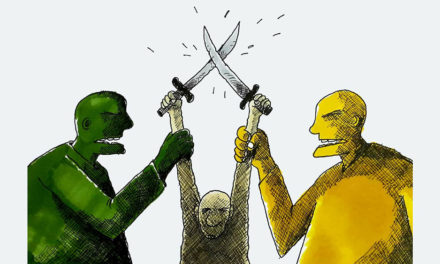(Photo: Sabah Arar/AFP)
While the world is approaching 2021 with an optimistic outlook, it is difficult to assess whether Iraq will be better off than it was in 2020. This time last year, under a caretaker government, Iraq was on the brink of war: as the United States assassinated Qods Force Commander Major General Qassim Soleimani and Popular Mobilization Forces (PMF) Deputy Abu Mahdi Al-Muhandis on Iraqi soil, disrupting the regional and global balance of power. Since then, tensions in the region continue and the political situation remains uncertain.
Shortly after, COVID-19 began to spread throughout the Middle East, and it was only until the final days of 2020 that the vaccination process was initiated across parts of the world. It remains uncertain when Iraq, like other developing countries, will secure the vaccine for its population and how it will manage the distribution. The two most prominent vaccines pose logistical difficulties for Iraq, due to their stringent storage requirements.
In May 2020, Iraq formed a new government. Expectations were realistic, the positive messages Prime Minister Mustafa Al-Kadhimi sent in his early days in office were reassuring. However, the situation began to deteriorate rather quickly with his indecisiveness and miscalculations in the following months. The handling of COVID-19 by the new government was substandard. As the whole world imposed lockdowns to mitigate the spread of the virus, the Iraqi government bowed under public pressure and eased them.
The most dangerous outcome of the compounded crises Iraq faced in 2020 was the plummeting of oil prices, which paralyzed Iraq’s rentier economy. The interim government, designed to be weak and tasked with one item, namely early elections in mid 2021, was suddenly forced to deal with a problem that Iraq has been suffering from since the 1960s: an over-reliance on oil sales and a bloated public sector.
As a response to the deteriorating economic situation, Deputy Prime Minister and Minister of Finance Ali Allawi laid down a road map for economic reform in his White Paper. The implementation of the action plan stemming from the White Paper requires years of effort in order to produce meaningful results. For now, the state’s immediate needs are reducing its astronomical spending and finding immediate solutions to pay civil servants and pensioners. Instead, Iraq’s decision-makers sought a quick fix by devaluing the Iraqi dinar by nearly 23%, despite warnings that tampering with the dinar would cause bigger financial problems. This move set the fragile market into another shock after the drop in oil prices due to the COVID-19 pandemic. Furthermore, Kadhimi’s cabinet baffled experts by proposing an annual budget that increased government spending.
The 2019 protest movement was able to force the resignation of the previous premier, Adil Abd Al-Mahdi, changing the face but not the substance of government. Kadhimi arose from the same political equation that brought Abd Al-Mahdi to power. The current government insists on the same practices that previous governments have been criticized for, while continuing its unsound economic policy instead of focusing on providing services and creating new jobs outside the public sector. Reform is not easy and the protest movement is nuanced, which raises questions about its potential to impact reforms. A distinction must be made, in assessing the impact of the demonstrations, between the frequency and size of protests and their ability to produce distinguishable leaders, who are not later co-opted and hired by the government.
Reform is the responsibility of every Iraqi. Not only the demonstrators, but also political elites, clerics, intellectuals and everyday citizens all need to contribute. As Iraq struggles with COVID-19, the reemergence of Da’ish, the situation of Iraq’s minorities; corruption remains the biggest challenge of 2021. The underlying issue is how Iraq’s institutions and society think and act on reform. Reform is neither fast, nor necessarily always visible. It is a slow and complicated process that requires persistence and understanding rather than slogans and promises. It requires careful planning and a long-term vision.

Muhammad Al-Waeli
Muhammad Al-Waeli is a Ph.D. candidate in management focusing on leadership, reform, and institutions in Iraq.










